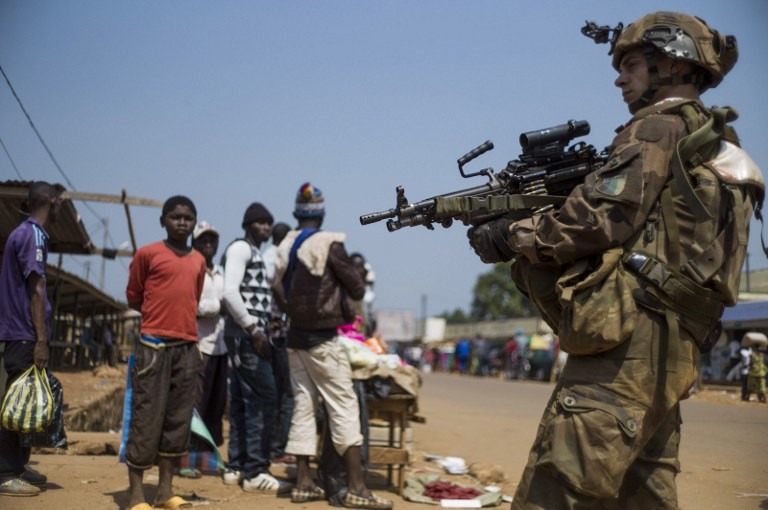SUMMARY
This is AI generated summarization, which may have errors. For context, always refer to the full article.

BANGUI, Central African Republic – France on Tuesday, December 17, said other European nations would send troops to the Central African Republic to prop up a military force on the ground attempting to disarm militias dispensing deadly violence.
The United Nations says some 210,000 people have been displaced in the capital Bangui alone in two weeks of unrest largely pitting Christians against Muslims, and France at the weekend called for more help from its European partners to assist its 1,600 troops on the ground.
“We will soon have troops on the ground provided by our European colleagues,” French Foreign Minister Laurent Fabius told the lower house of parliament in Paris, without naming the countries.
In Brussels, a Belgian military source told Agence France-Presse on condition of anonymity that the government was considering the dispatch of some 150 troops for “a protection mission”, possibly to secure airports.
The Spanish government, meanwhile, has backed plans to send a Hercules military transport aircraft with a “maintenance and support unit” of up to 60 personnel, subject to parliamentary approval. But it is not likely to include combat troops.
It is as yet unclear whether other countries will also be assisting France on the ground, other than providing logistical help.
Central Africa spiraled into chaos after a March coup in which the mainly Muslim Seleka rebel group overthrew President Francois Bozize.
France deployed its troops to the impoverished and notoriously unstable country on December 5 under a UN mandate to support an African peacekeeping force that had been struggling to quell the violence.
Some 600 people have been killed in the Central African Republic in less than two weeks and two elite French soldiers have died there in a gun battle.
Disarming Christian militias
In Bangui, French soldiers Tuesday launched a dawn offensive on a northern district, Boy-Rabe, known as a stronghold of Christian militia who oppose the Muslim former rebels, their leader said.
“It was an operation to make the district safe,” General Francisco Soriano, who heads the French troops in CAR, told a news conference.
The French troops had so far focused on disarming the Seleka.
“It’s a good thing that they’re coming here. They disarmed people, even some who had gone into the fields with their machetes,” said Augustin Ngoua Kouzou, a mason who works in Boy-Rabe.
The CAR is a deeply poor, landlocked nation of 4.6 million — 80% of whom are Christian — with a history of coups, rebellions, army mutinies and civil unrest that has prevented the exploitation of its mineral wealth.
But the latest crisis is the first to take on a sectarian dimension that has roused international fears of mass slaughter.
Since the crisis began a year ago, more than 710,000 people have been displaced inside the CAR and over 75,000 have fled across its borders, according to the UNHCR. Seleka forces are accused of committing numerous atrocities, including killings, rape and pillage.
Days before the French intervention, Christian militias loyal to ousted president Bozize launched an attack in the outskirts of Bangui against Muslims and the clashes claimed about 300 lives, according to the Red Cross.
Neutralised and consigned to barracks, many former Seleka fighters have been enraged by what they see as one-sided disarmament, leaving them incapable of defending the Muslim community against the vengeance of Bangui’s mostly Christian population.
‘Unity is our sole wealth’
Many residents of the capital reproach the French soldiers for generally staying on major roads and away from dirt streets lined with countless shacks, where looting and lynching by both religious communities still takes place.
Prime Minister Nicolas Tiangaye, who was in the opposition to Bozize, appealed for calm “so that peace can return”.
“We must safeguard national unity and understanding. This is the foundation of the country. A single country, a single people,” Tiangaye told Agence France-Presse. “Unity is our sole wealth. Conflicts between communities or between faiths undermine that unity.”
A source close to the government said Tiangaye and transitional president Michel Djotodia, who previously led Seleka, would meet Wednesday to try to defuse tensions between them exacerbated by the firing of three ministers.
A Congolese mediator, General Noel Leonard Essongo, and the African Union’s representative, Awa Ahmed Youssouf, would also take part, the source said. – Rappler.com
Add a comment
How does this make you feel?
There are no comments yet. Add your comment to start the conversation.